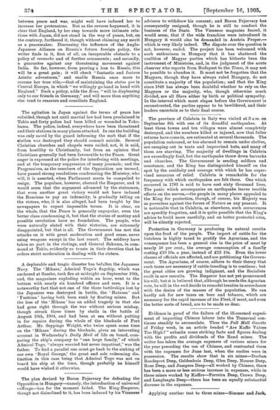The agitation in Japan against the terms of peace has
subsided, though not until martial law had been proclaimed in Tokio and forty police had been killed or wounded in Yoko- hama. The police, indeed, everywhere have been threatened and their stations in many places attacked. In one the building was only saved by the guard informing the mob that if the station was destroyed they should commit suicide. Several Christian churches and chapels were raided, not, it is said, from hostility to Christianity, but from an opinion that Christians generally had been favourable to the Peace. Great anger is expressed at the police for interfering with meetings, and at the temporary suppression of many journals; and the Progressives, as the members of the Opposition are termed, have passed strong resolutions condemning the Ministry, who will, it is asserted, when Parliament meets be compelled to resign. The populace, however, cheered the Emperor, and it would seem that the argument advanced by the statesmen, that even another great victory would not have induced the Russians to pay an indemnity, is gradually telling on the rioters, who, it is also alleged, had been taught by the newspapers to expect impossible terms. It is clear, on the whole, that the Peace is generally unpopular, even the better class condemning it, but that the stories of mutiny and possible revolution have no foundation. The people, who were naturally elated with their victories, are extremely disappointed, but that is all. The Government has met the attacks on it with great moderation and good sense, never using weapons except in the last resort. The soldiery have taken no part in the riotings, and General Sakuma, in com- mand at Tokio, evidently so trusts in their devotion that he orders strict moderation in dealing with the rioters.










































 Previous page
Previous page